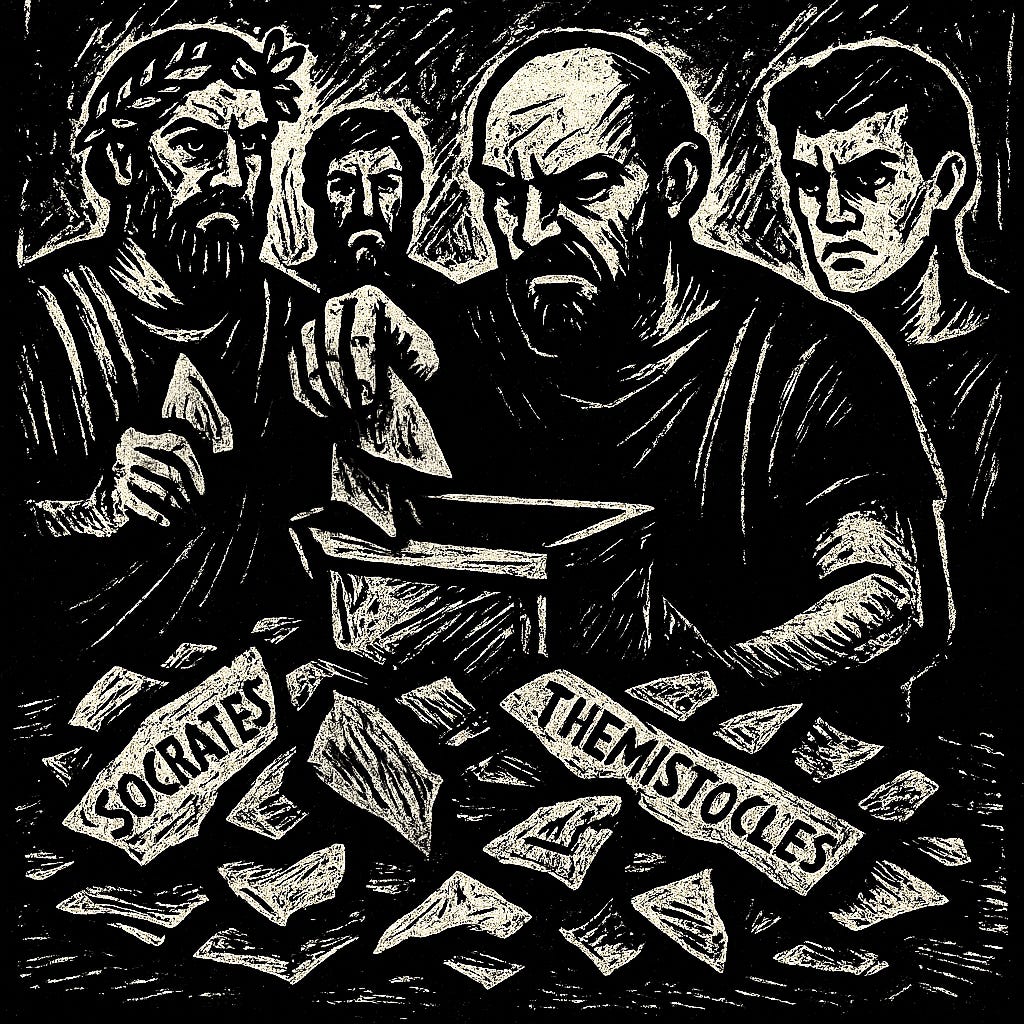Conditioned to self-interest with emotions locked away
If that's what they call normal then I'd rather be insane
I’ve written a lot about being weird on purpose. Society at large has a tendency toward everyone being the same, and this makes a lot of sense—we come from tribal roots, and even today, we’re wired to like things that are similar to us.
I’ve found tremendous value in righteous nonconformity, where I have a counter force to this constant pressure from the outside. This means feeling good enough about wearing that Batman T-shirt to high school (9th grade) to run the risk of ostracism.
Ostracism traces its etymology to ancient Greece, where an ostrakon was a shard of pottery. The citizens were given an opportunity every year to vote on whether to kick someone out. If they voted yes, then they’d hold a second vote, where every citizen would write a name on one of those ostrakons.
If your name was on 6000 or more ostrakons, then you were ostracized—you had to leave the city for ten years, after which time you could come back. Of course, you were always subject to future ostracism.
Ostracism, then, was a democratic way to kick people out of society. Democratic doesn’t always mean fair, though, does it? With everyone voting on who got thrown out, it was often a matter of manipulation and politicking to get those 6000 ostrakons. If today’s democracies face serious threats from outside manipulation, they are as nothing to what the Greeks faced 2500 years ago.
Fast forward with me now to 1989.
The lone full-length record from the band Operation Ivy has just been released, but the band has already broken up. 36 years from now, I’ll look back on this moment with awe, wondering how anyone could produce this much incredible material in such a short time.
Teenaged children wrote and performed these songs. Not all of Jesse’s lyrics are this good, but they all seem wise beyond their years, and they still speak to me across the decades.
Teenagers know a lot about ostracism. The feeling of injustice from being excluded is painful, and it can feel—and be—very unjust. This can lead to dark thoughts and a downhill spiral fast.
On the other side of this, though, sits Operation Ivy. In spite of their youth, they’ve been able to zoom out 30,000 feet so they can see the whole picture. Behave a certain way—or else, society seems to say.
Or else what, Op Ivy seems to ask.
Socrates wasn’t ostracized in the full and proper definition of the word, but he was ostracized in the modern sense. What I mean is that people ultimately voted to have him executed because of the way he saw the world.
Instead of acknowledging that the gods of Olympus were real and superior to all other gods, Socrates refused to conform. Instead of admitting to a false reality, he was forced to drink poison hemlock. If that’s what they call normal, Socrates seemed to say, then I’d rather be insane.
Calling out the things you notice can be really fun, but when almost nobody sees things the same way as you—or when the power structure sees things differently, more to the point—ostracism can be a painful result.
However, you can develop a sort of immune system to ostracism if you’re able to frame these situations a little differently. For Socrates, it meant not accepting anything less than true reality, and trading off his life for that assertion. For Op Ivy, it meant giving a huge middle finger to the established music industry and foregoing commercial success in favor of a DIY approach.
For me, it meant piercing my eyebrow with a safety pin so I simultaneously reminded myself and others that I wasn’t interested in nonrighteous conformity.






I'd say that right now the entire idea is to be different and everyone claims it in such a way to actually become confirmist. This was the irony of the hipsters and the typical pattern of the neuro'divergents.' There's such confirmaty to their non-conformity as to become the very thing they hated. Punk was the same, it wasn't hard to tell who the punk rockers were. They conformed
"...people ultimately voted to have him executed because of the way he saw the world." Actually, they forced him to commit suicide by taking a shot of hemlock, a poisonous substance.
Because of this, writers in later eras, such as 20th century American leftist journalist I.F. Stone, have used his case to demonstrate the mob mentality behind justice in democracies.